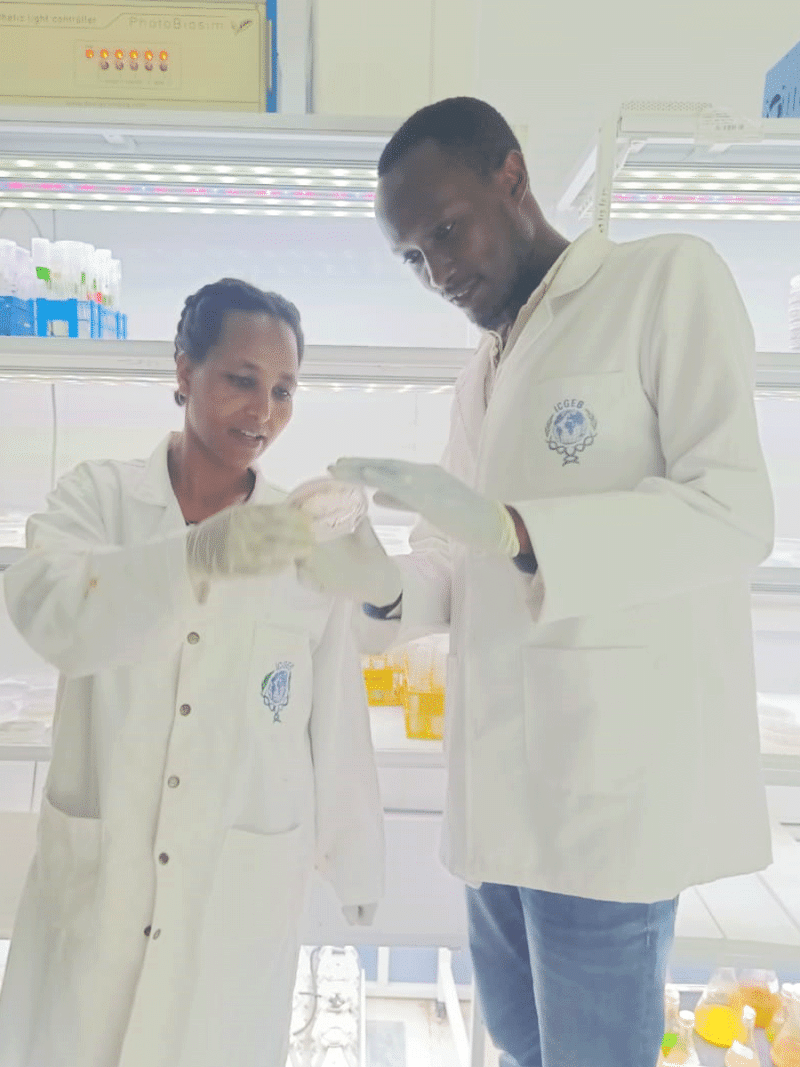Before joining the team researching microalgae at the International Centre for Genetic Engineering and Biotechnology (ICGEB) in New Delhi, India, Abeba Haile Mariamenatu knew very little about these organisms.
Mariamenatu, an Ethiopian biotechnologist in the Department of Biotechnology at Debre Berhan University, in her home nation, was originally more interested in exploring the potential of bacteria for the production of bioproducts. But when she applied for and received a PACTs fellowship, her scientific interests and approach to science changed. She joined Pavan Jutur's Omics of Algae group in July 2022, at ICGEB in New Delhi, and completed her 6-month visit on 15 January 2023. There, she began exploring the metabolic potential of microalgae, aimed at the production of high-value products, useful to industry and medicine.

Omics is a term for a broad spectrum of research areas within the study of microorganisms like microalgae, including their genetic, fat, and protein setup.
"When I applied for a PACTs fellowship, I never thought I could be one of the recipients because of the high competition," Mariamenatu recalled. "But when I learned that I was a winner, I felt I was really lucky. Receiving such a prestigious fellowship motivated me, and I soon started working hard, to fill the gaps in my preparation."
The ProgrAmme of CollaboraTions with LDCs (PACTs) is a joint programme that the UN Technology Bank for Least Developed Countries, TWAS, and ICGEB launched in 2021. It is targeted at scholars from the least developed countries (LDCs) and offers early-career scientists a six-month exchange visit in any of ICGEB's laboratories. In addition to scientific skills, the participants learn from accomplished senior scientists how to build long-lasting collaborations and develop soft skills including leadership, time management, and effective communication.
"This PACTs fellowship was an incredible opportunity for personal growth and a turning point in my career," Mariamenatu said.
The great potential of microalgae
The world of microalgae offers great potential in many fields. These tiny, aquatic organisms play a crucial role in the carbon cycle, the process whereby carbon circulates from the Earth to the atmosphere, and returns back to Earth.

Microalgae are important because, through the photosynthesis, they pull carbon out of the environment and release large amounts of oxygen into the atmosphere. Scientists are interested in learning more about their physiology because they could represent excellent raw material for biofuel production. In addition, if adequately grown, they could be a natural factory for the production of molecules for medicine and cosmetics.
"At ICGEB, I familiarized myself with different types of microalgae, algae isolation techniques, algal culture media and their preparation techniques, pigment extraction techniques, and learned to operate advanced equipment used in pigment extraction and analysis," Mariamenatu said. "In my country, the microalgal field is an untapped research area, relatively new. The skills I learned are crucial to run algal research and, after this experience, my future career plan is to continue studying this field in my country."
During her work at ICGEB, Mariamenatu focused on the extraction of a brown pigment called fucoxanthin from the diatom Phaeodactylum tricornutum. Diatoms are photosynthesising algae found in almost every aquatic environment, including fresh and marine waters, but also in soils.
Fucoxanthin has anti-oxidant, anti-inflammatory and anti-cancer effects, and also has the potential to promote health and reduce the risk of degenerative diseases.
Mariamenatu focused on better ways to obtain fucoxanthin from Phaeodactylum tricornutum, to explore the potential for alternative therapeutic applications. To this purpose, she set up the conditions that promote the diatom's growth, and optimized the protocol to extract the pigment. The experiments revealed that this particular alga is light-sensitive, and that intense light slows its growth, reducing fucoxanthin accumulation in the cell, whereas, low light intensity accelerates its growth.
During the six-month period that she spent at ICGEB, however, her quest for knowledge led her to improve her skills in other fields as well.
Career development prospects
Along with her research work, she has been involved in and performed different activities which improved her scientific knowledge, providing overall understanding of the work dynamics in an international laboratory.
"I have learned how to carefully plan and schedule intensive laboratory activities, and enhanced my communication skills, since I had to speak English for the whole six months," she recalled.
Access to all previously published articles by the group, and the chance to ask for senior research fellows' advice have boosted her self-confidence. As a result, with the members of the Omics of Algae group, she gave her contribution and wrote two book chapters that will be included in publications by Tylor & Francis Group and Elsevier, respectively.
PACTs also offered Mariamenatu a ‘Soft Skill training’ package: a series of high-level courses addressing topics such as genome editing, digital sequence information, biosafety, intellectual property rights, and writing scientific papers.
For her future, she has clear-cut plans. "I can use the knowledge and skills I have learned in my home laboratory, not only for myself, but also to offer training to my colleagues and other students," she said. "Thanks to the PACTs fellowship, now I am strongly motivated to pursue a PhD in the field of microalgae."
Cristina Serra

